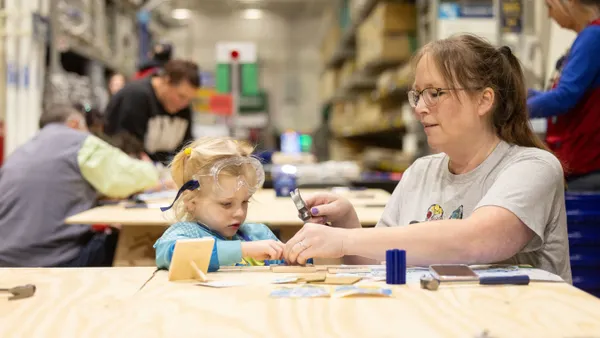Dive Brief:
- Adidas is about to start selling its UltraBoost Uncaged Parley shoe made from 3D-printed recycled ocean waste, which the athletic apparel maker unveiled as a concept last year under a partnership with ocean conservation group Parley for the Oceans.
- The new model uses the design for Adidas' popular UltraBoost Uncaged shoe, but its soft Primeknit upper is built with 95% ocean plastic and 5% recycled polyester. Other parts, such as the shoelaces, heel cap, heel webbing and sock-liner, were also made from materials retrieved by Parley during coastal operations in the Maldives.
- About 7,000 pairs will available at a price of $220 each in mid-November from Adidas stores and the company’s website.
Dive Insight:
This UltraBoost release follows through on an announcement Adidas made more than a year and a half ago about partnering with Parley for the Oceans to make shoes from recycled materials and with sustainability goals in mind. Though it has been a while since that initial announcement, Adidas and Parley have been busy: In addition to the new shoe, the partners also have collaborated on jerseys made from recycled ocean plastics for fans of European soccer clubs Bayern Munich and Real Madrid.
Athletic shoe companies have not always been models of sustainability, but in recent years Adidas has made several moves with sustainability goals in mind, including a decision to eliminate plastic bags at all retail locations, and a pledge to obtain 30% of its cotton from sustainable sources. By the end of next year, Adidas plans to produce at least a million pairs of shoes using ocean plastic. (It sounds like Parley for the Oceans also would be very interested in working with other shoe manufacturers on similar products, but that Adidas may be the first. If so, it would be great to see that change.)
Throughout the retail sector, there have been many companies turning to more environmentally friendly strategies and products in recent years. Wal-Mart and Target both have been aggressive about adopting progressive practices, and both recent ended up at the top of a list of companies recognized for adoption of solar energy. They aren't the only retailers setting a new standard for sustainability: Zara also recently introduced a new clothing line that leverages sustainable materials.
Companies that have been progressive about sustainability don't always want a lot of attention for it, as has been the case with Wal-Mart, despite having pretty well-publicized sustainability goals and achievements. It's been argued that they don't want to have their practices examined too closely, possibly for fear that some amount of unsustainable materials could be creeping into the manufacturing process. But the whole point of these programs should be to take them seriously enough to do them the right way. If they take them seriously, maybe customers will do the same.













